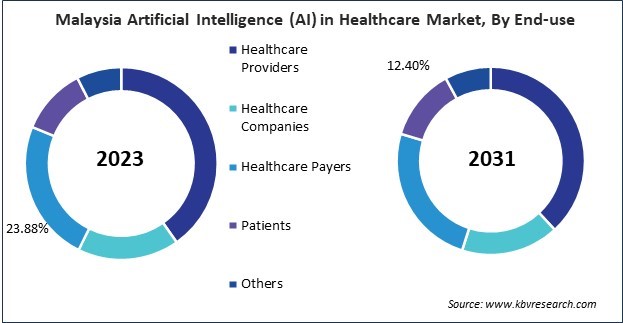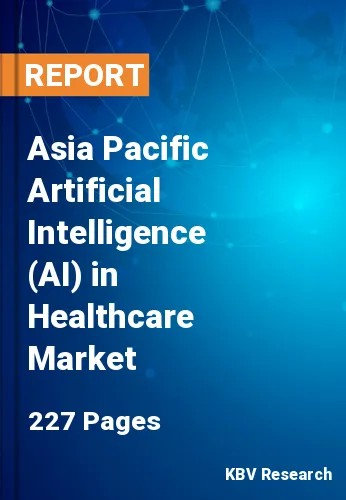The Asia Pacific Artificial Intelligence (AI) in Healthcare Market would witness market growth of 42.5% CAGR during the forecast period (2024-2031).
The China market dominated the Asia Pacific Artificial Intelligence (AI) in Healthcare Market by Country in 2023, and would continue to be a dominant market till 2031; thereby, achieving a market value of $16,002.4 million by 2031. The Japan market is registering a CAGR of 41.6% during (2024 - 2031). Additionally, The India market would showcase a CAGR of 43.3% during (2024 - 2031).

Healthcare providers can streamline their revenue cycle management and save paperwork using AI technologies to automate administrative processes like medical coding, billing, and claims processing. Implementing AI-driven systems in healthcare facilities has the potential to enhance patient flow and operational efficiency by optimizing resource allocation, appointment scheduling, and workflow management.
As AI algorithms become more sophisticated, a growing emphasis is being placed on the development of transparent and explicable models. The objective of explainable AI techniques is to improve the comprehensibility of AI insights, thereby facilitating clinicians' comprehension of the reasoning behind recommendations prompted by AI and growing confidence in decision-making based on AI. Federated learning is an emerging approach that allows AI models to be trained across multiple decentralized data sources without sharing sensitive patient information. This privacy-preserving technique enables healthcare organizations to collaborate and leverage collective knowledge while maintaining data security and patient privacy.
China's aging population is growing rapidly, leading to an increased prevalence of age-related chronic diseases and conditions, such as cardiovascular disease, diabetes, and dementia. China's vast geographical size and uneven distribution of healthcare resources present challenges in providing equitable access to healthcare services, especially for elderly populations in rural and remote areas. AI-driven remote monitoring and telemedicine solutions can bridge this gap by enabling remote consultations, monitoring vital signs, managing chronic conditions, and improving access to quality healthcare for elderly patients across China. By 2045, the United Nations estimates that approximately 450 million individuals in China will be 60 or older. Therefore, due to the above-mentioned factors, the artificial intelligence (AI) in healthcare market will grow significantly in this region.
Free Valuable Insights: The Global Artificial Intelligence (AI) in Healthcare Market is Predict to reach USD 237.9 Billion by 2031, at a CAGR of 41.3%
Based on Offering, the market is segmented into Software, Hardware (Processors, Memory, and Network), and Services. Based on Software Platform, the market is segmented into Application Program Interface (API), and Machine Learning Framework. Based on Software Solution, the market is segmented into On-premise, and Cloud. Based on Technology, the market is segmented into Machine Learning, Natural Language Processing, Context-aware Computing, and Computer Vision. Based on End-use, the market is segmented into Healthcare Providers, Healthcare Companies, Healthcare Payers, Patients, and Others. Based on Application, the market is segmented into Patient Data & Risk Analysis, Virtual Assistants, Wearables, Medical Imaging & Diagnostics, Cybersecurity, Mental Health, In-Patient Care & Hospital Management, Precision Medicine, Drug Discovery & Development, Lifestyle Management & Remote Patient Monitoring, Healthcare Assistance Robots, Research, Others. Based on countries, the market is segmented into China, Japan, India, South Korea, Singapore, Malaysia, and Rest of Asia Pacific.
By Offering
By Technology
By End-use
By Application
By Country
Our team of dedicated experts can provide you with attractive expansion opportunities for your business.

